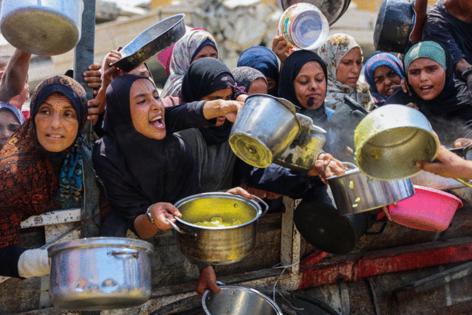Commentary: Gaza's starvation is America's shame
Published in Op Eds
Early in my foreign affairs career, I mostly avoided working on Israel and Palestine. The issues were fraught with emotion. I didn’t think I understood it well enough to have an informed position.
I believe the same sentiment that led me to avoid the topic before is what shapes many reactions (or nonreactions) to this conflict today.
But we must not mistake passion for knowledge. Many have become outraged at the ongoing war and famine in Gaza, including hundreds of former members and leaders of Israel’s own military and intelligence services. Yet my social media feed is still replete with zealous defenses of the Israeli government, regardless of its actions, and accusations of antisemitism for anyone who says otherwise. This passion is driving other people to look away.
I have empathy for the history that drives these hardened positions, but they are emotional, uninformed and deadly. It’s time for us all to face the reality that Israel’s government is committing atrocities in Gaza and is doing so with American support.
Hamas’ war crimes against Israelis (and Palestinians) do not change that calculation. The people of Gaza deserve basic humanity regardless of Hamas’ actions.
If you disagree with that statement, look at the photos of skeletal children in Gaza — who make up half of the strip’s population — and tell me they are terrorists who deserve that fate.
Even if Israel’s own assertions about aid delivery in Gaza were accurate, Gazans, and the hostages, would still be starving. Israel claims that 1 million meals are being distributed a day, which is only one-sixth of the food the population requires. This would be grossly inadequate under ordinary circumstances, but it comes after an 11-week blockade this spring. Gazans are already severely malnourished, so meeting basic needs requires much more, including specialized treatment to prevent people from dying from eating foods their bodies can’t process in their deteriorated state.
The fact is this: International law and basic human decency demand that Israel provide the basic needs of the civilians trapped in areas it occupies. No military necessity or advantage is served by denying them food. Humanitarian organizations are ready to provide that aid.
But Israel has blocked those capable of delivering aid at scale and replaced them with a cynical show: a paramilitary organization with inadequate capacity and experience. The result is not only failure to relieve the starvation, but also death at distribution sites. Over 1,000 people have been killed trying to secure food so far, shot down by Israeli forces and American contractors reacting to the predictably chaotic scenes that Israel created.
As Jeremy Konyndyk, president of Refugees International and former director of the U.S. government’s foreign disaster assistance program, indicated in a recent interview, the crisis in Gaza can be managed if Israel simply allows access to real humanitarian organizations. The geography is small, and the population of 2 million is far less than in other complex humanitarian crises, such as Sudan. The immediate emergency is solvable. This famine is a policy choice.
It’s important to understand as well that “famines have momentum,” as Konyndyk said. The standards for categorizing a situation as famine are exceedingly high and hard to document in the best of conditions. By the time you reach famine levels of hunger, human suffering increases exponentially. The catch-22 of not being able to muster up enough concern over deteriorating food security until it reaches a point in which the population is permanently damaged has plagued humanitarians for decades. I saw it myself in South Sudan years ago.
Starving to death is a horrific way to go, but things are so bad in Gaza that people suffering from mass malnutrition will die of disease before starvation can set in, so the pace of death will rapidly escalate.
International responses are often hampered by terminology. Have we reached famine levels? Does it qualify as a genocide? Waiting for official use of these terms is dangerous, as it allows culpable leaders to continuously classify disasters just below what is considered unacceptable.
But whatever you call this, it is unacceptable. And since the United States is Israel’s largest supporter, its sole defender today at the United Nations and supplier of most of its weapons of war, we have leverage. Because Israel has chosen to starve an entire population, that leverage gives us responsibility.
I have friends in the U.S. government who still say it’s not that simple, that Israel would stay on this path regardless of America’s actions. I say to them: Prove me wrong. At a minimum, we would stop our complicity.
A majority of the Senate voted down an effort to stop the sale of bombs and firearms to Israel in response to widespread suffering in Gaza just days ago. Shame on the senators who refused to support even a small gesture to pressure Israel to change its path and Gaza’s future. To the 24 Democrats who voted to stop our complicity, thank you.
_____
Elizabeth Shackelford, a foreign affairs columnist for the Chicago Tribune, is a program director with the Institute for Global Affairs and a lecturer at Dartmouth College. She is currently co-writing the book “How US Foreign Policy Really Works” and is also the author of “The Dissent Channel: American Diplomacy in a Dishonest Age.” She was a senior fellow at the Chicago Council on Global Affairs and a career diplomat with the U.S. Department of State.
_____
©2025 Chicago Tribune. Visit at chicagotribune.com. Distributed by Tribune Content Agency, LLC.

























































Comments